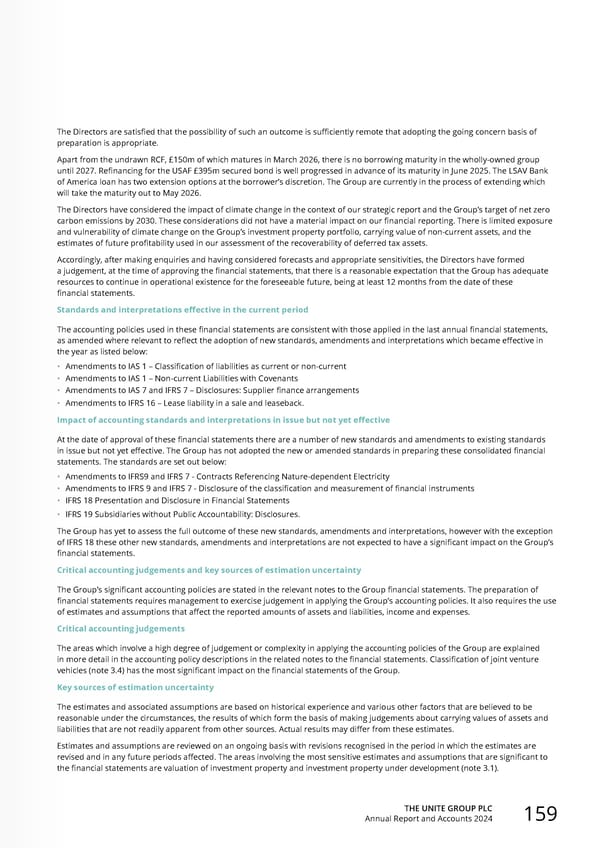THE UNITE GROUP PLC Annual Report and Accounts 2024 159 The Directors are satisfied that the possibility of such an outcome is sufficiently remote that adopting the going concern basis of preparation is appropriate. Apart from the undrawn RCF, £150m of which matures in March 2026, there is no borrowing maturity in the wholly-owned group until 2027. Refinancing for the USAF £395m secured bond is well progressed in advance of its maturity in June 2025. The LSAV Bank of America loan has two extension options at the borrower’s discretion. The Group are currently in the process of extending which will take the maturity out to May 2026. The Directors have considered the impact of climate change in the context of our strategic report and the Group’s target of net zero carbon emissions by 2030. These considerations did not have a material impact on our financial reporting. There is limited exposure and vulnerability of climate change on the Group’s investment property portfolio, carrying value of non-current assets, and the estimates of future profitability used in our assessment of the recoverability of deferred tax assets. Accordingly, after making enquiries and having considered forecasts and appropriate sensitivities, the Directors have formed a judgement, at the time of approving the financial statements, that there is a reasonable expectation that the Group has adequate resources to continue in operational existence for the foreseeable future, being at least 12 months from the date of these financial statements. Standards and interpretations effective in the current period The accounting policies used in these financial statements are consistent with those applied in the last annual financial statements, as amended where relevant to reflect the adoption of new standards, amendments and interpretations which became effective in the year as listed below: • Amendments to IAS 1 – Classification of liabilities as current or non-current • Amendments to IAS 1 – Non-current Liabilities with Covenants • Amendments to IAS 7 and IFRS 7 – Disclosures: Supplier finance arrangements • Amendments to IFRS 16 – Lease liability in a sale and leaseback. Impact of accounting standards and interpretations in issue but not yet effective At the date of approval of these financial statements there are a number of new standards and amendments to existing standards in issue but not yet effective. The Group has not adopted the new or amended standards in preparing these consolidated financial statements. The standards are set out below: • Amendments to IFRS9 and IFRS 7 - Contracts Referencing Nature-dependent Electricity • Amendments to IFRS 9 and IFRS 7 - Disclosure of the classification and measurement of financial instruments • IFRS 18 Presentation and Disclosure in Financial Statements • IFRS 19 Subsidiaries without Public Accountability: Disclosures. The Group has yet to assess the full outcome of these new standards, amendments and interpretations, however with the exception of IFRS 18 these other new standards, amendments and interpretations are not expected to have a significant impact on the Group’s financial statements. Critical accounting judgements and key sources of estimation uncertainty The Group’s significant accounting policies are stated in the relevant notes to the Group financial statements. The preparation of financial statements requires management to exercise judgement in applying the Group’s accounting policies. It also requires the use of estimates and assumptions that affect the reported amounts of assets and liabilities, income and expenses. Critical accounting judgements The areas which involve a high degree of judgement or complexity in applying the accounting policies of the Group are explained in more detail in the accounting policy descriptions in the related notes to the financial statements. Classification of joint venture vehicles (note 3.4) has the most significant impact on the financial statements of the Group. Key sources of estimation uncertainty The estimates and associated assumptions are based on historical experience and various other factors that are believed to be reasonable under the circumstances, the results of which form the basis of making judgements about carrying values of assets and liabilities that are not readily apparent from other sources. Actual results may differ from these estimates. Estimates and assumptions are reviewed on an ongoing basis with revisions recognised in the period in which the estimates are revised and in any future periods affected. The areas involving the most sensitive estimates and assumptions that are significant to the financial statements are valuation of investment property and investment property under development (note 3.1).
 Home for Success: Unite Students Annual Report 2024 Page 160 Page 162
Home for Success: Unite Students Annual Report 2024 Page 160 Page 162